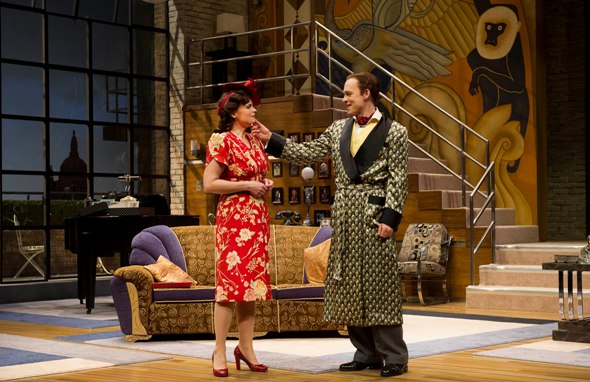Sophistication meets innuendo: Shaw Festival puts fine edge on Coward’s ‘Present Laughter’
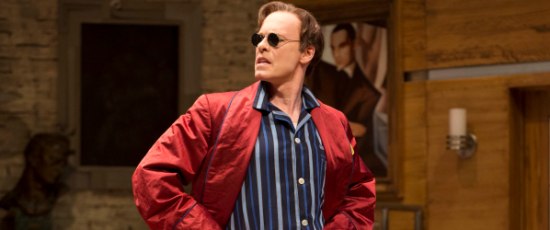 Review: “Present Laughter” by Noël Coward at Canada’s Shaw Festival through October 28. ****
Review: “Present Laughter” by Noël Coward at Canada’s Shaw Festival through October 28. ****
By Nancy Malitz
NIAGARA-ON-THE-LAKE, ONTARIO — Twice in the last few months I have witnessed actor Steven Sutcliffe playing another actor.
The first was at Chicago Shakespeare Theater, where he was outstanding as Ned, a terminally ill member of Shakespeare’s troupe, on the night of a bizarre confessional visit by the Queen of England herself.
The second is now playing at the Shaw Festival here, with Sutcliffe as a different sort of thespian entirely — a pampered and wildly popular matinee idol, fending off middle age and engaging in flamboyant naughtiness that is barely reined in by his coterie of minders.
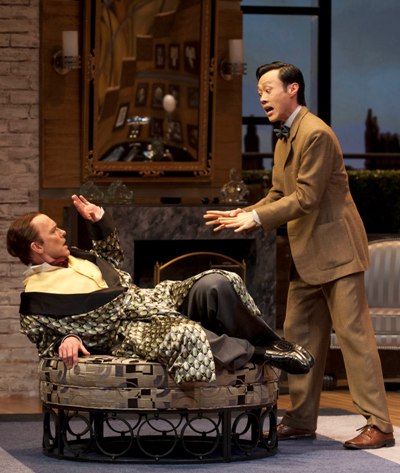 All sophistication and sexual innuendo is Noël Coward’s “Present Laughter,” a self-portrait that explores, with mirth and guarded honesty, the blurring lines between life on stage and the well-staged life, between ageless art and the aging man.
All sophistication and sexual innuendo is Noël Coward’s “Present Laughter,” a self-portrait that explores, with mirth and guarded honesty, the blurring lines between life on stage and the well-staged life, between ageless art and the aging man.
The 1939 work, which originally starred Coward, may not be his greatest play, but it’s hilarious, and quite apt for the summer festival season. Shaw deserves the present laughter it’s getting for a production that is sumptuously designed and presented, with fine character performances in the best tradition of repertory casting — the assembled company members take on multiple roles throughout the season. For a veteran actor such as Sutcliffe, who has ranged wide in 11 years with the festival, the chance to ham it up as Garry Essendine must be plum indeed.
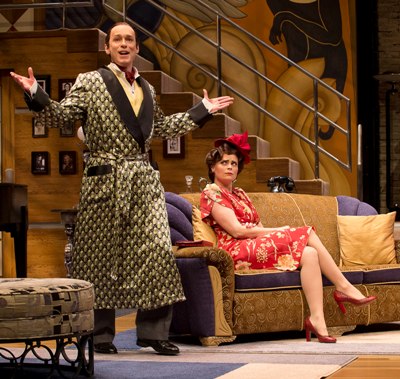 Coward being Coward, any examination of the mega-star’s lot will demand a dozen different dressing gowns and frequent comedic expostulations. His stage play is a parade of amorous predicaments that read like an encyclopedia of shenanigans from pre-code Hollywood:
Coward being Coward, any examination of the mega-star’s lot will demand a dozen different dressing gowns and frequent comedic expostulations. His stage play is a parade of amorous predicaments that read like an encyclopedia of shenanigans from pre-code Hollywood:
We have the cuckold, the philanderer, the cuckolded philanderer, the predatory female, the stalker protégé, the lascivious valet, the ever so willing ingénue and a wife who airily looks the other way. All dealt with by Coward in a cocktail of high wit and heavy intimation.
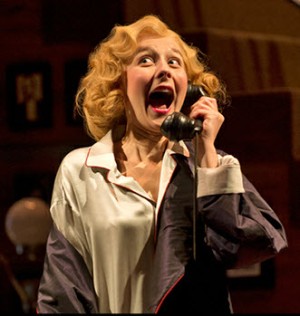 Take, for example, the opening scene, which we soon learn is the morning ritual for the blithe staff of Garry Essendine. His high-ceilinged drawing room (designed by William Schmuck) is a splendid Art Deco affair, with windows floor-to-ceiling and curtains that draw themselves along one wall, a sweeping curve of a staircase on the other, backed with a huge mural of exotic animals done in inlaid woods. It is, in short, a room designed for the descent via stairs of Our Man Who Makes an Entrance, although the busy puttering crew knows this rarely happens before noon.
Take, for example, the opening scene, which we soon learn is the morning ritual for the blithe staff of Garry Essendine. His high-ceilinged drawing room (designed by William Schmuck) is a splendid Art Deco affair, with windows floor-to-ceiling and curtains that draw themselves along one wall, a sweeping curve of a staircase on the other, backed with a huge mural of exotic animals done in inlaid woods. It is, in short, a room designed for the descent via stairs of Our Man Who Makes an Entrance, although the busy puttering crew knows this rarely happens before noon.
The action begins as a young woman dressed in a man’s pajamas pops out of a door at far left, quick to phone her girlfriend with the giggling news that she has indeed done you-know-what with you-know-who. She then feigns innocence as Garry’s people make their entrances and exits while taking her “lost latch-key” tale in stride. Garry’s assistant Monica, a drip line of dramatic irony played to perfection by Mary Haney, delivers the play’s first zingers.
Garry’s entrances are always grand, and when he isn’t already play-acting, we sense that he is ever-seeking the rush that the next moment of dramatic urgency might supply. Most mornings it is apparently his inability to remember just who it is in the bedroom below — cue the assistant’s drip line — and his subsequent need to escape the cloying arms of whomever that particular adoring creature might be. (Today it’s Daphne, played by the delightfully goofy Julia Course.)
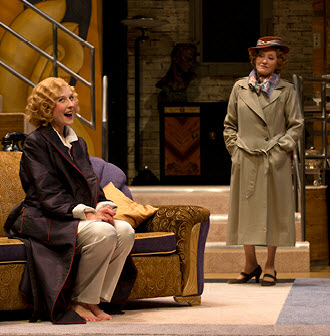 Lovers’ farewells being the stock in trade of matinee idols, Garry extricates himself easily enough with borrowed lines. But it’s a credit to Sutcliffe that we also get an early whiff of the self-made trap our leading man is in. One of the best moments in the play comes much later, when Garry finds himself alone in his flat, sans entourage and utterly helpless, because there’s no one to play to.
Lovers’ farewells being the stock in trade of matinee idols, Garry extricates himself easily enough with borrowed lines. But it’s a credit to Sutcliffe that we also get an early whiff of the self-made trap our leading man is in. One of the best moments in the play comes much later, when Garry finds himself alone in his flat, sans entourage and utterly helpless, because there’s no one to play to.
The two most important women in Garry’s life are Monica, his assistant, and Liz, his wife long gone from bed, played by the endearing Claire Jullien as a woman confident in her own skin, and wise enough to know his career will require some careful handling through the shoals ahead. Sutcliffe and Jullien create a fine rapport. One gets the sense that they are headed for the pasture together, eventually, a la Lunt and Fontanne. The clever conspiracy that Jullien’s Liz concocts to extricate Garry from an overnight mess that shocks even him is a highlight of the second act.
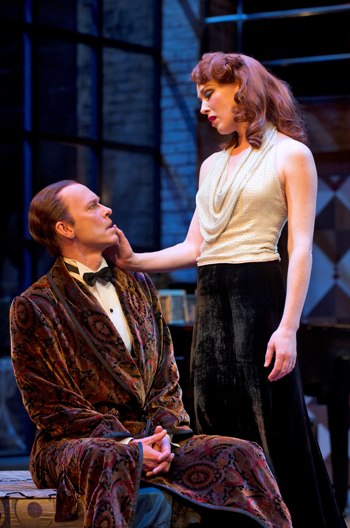 Garry’s other partners, producer Hugo and manager Morris, are in Coward’s play to provide two sides of an amorous triangle with polyhedral tendencies. The other side is the femme fatale Joanna, whose behavior as wife, adulteress and vanquishing predator hurtles the story forward. Coward doesn’t give Hugo and Morris much to work with beyond cardboard characterization, but Patrick McManus and Gray Powell amply flesh out their reactions to the multi-faceted predicament that Matinee Idol, Inc., finds itself in. The vampish Joanna created by Moya O’Connell is a seductress of terrifying skill, and her encounter with Garry is a show-stopper.
Garry’s other partners, producer Hugo and manager Morris, are in Coward’s play to provide two sides of an amorous triangle with polyhedral tendencies. The other side is the femme fatale Joanna, whose behavior as wife, adulteress and vanquishing predator hurtles the story forward. Coward doesn’t give Hugo and Morris much to work with beyond cardboard characterization, but Patrick McManus and Gray Powell amply flesh out their reactions to the multi-faceted predicament that Matinee Idol, Inc., finds itself in. The vampish Joanna created by Moya O’Connell is a seductress of terrifying skill, and her encounter with Garry is a show-stopper.
Director David Schurmann, who has a long record as an actor at Shaw, makes smart use of the vast space and keeps the action fluid as a tennis game. He does allow several supporting roles to veer from clever sophistication into broad farce that seems un-Cowardly, although the physical jokes of the acrobatic Jonathan Tan — as the callow would-be playwright who literally leaps unwanted into Garry’s life — are admittedly very funny. James Pendarves adds spice as the club-hopping valet Fred, who has learned all the wrong lessons from his boss. Corrine Koslo, as the chain-smoking housekeeper Miss Erikson, seems to belong in “Noises Off.”
Related Links:
- The Shaw Festival offers 11 summer productions: Click here for an overview
- “Present Laughter” performance location, dates and times: Visit the Shaw Festival calendar
Photo captions and credits: Home page and top: Garry Essendine (Steven Sutcliffe) makes a star turn out of getting up in the morning. Descending: Would-be playwright Roland Maule (Jonathan Tan) can’t stay away. Liz Essendine (Claire Jullien) endures her husband’s antics. Ingénue Daphne (Julia Course) calls her girlfriend after spending the night. Daphne (Julia Course) makes up a story about losing her latch-key for the skeptical Monica (Mary Haney). Even Garry has to admit that Julia (Moya O’Connell) is dangerously persuasive. Below: The matinee idol’s sumptuous flat. (Photos by David Cooper and Emily Cooper.)
Tags: Claire Jullien, Corrine Koslo, David Schurmann, Gray Powell, James Pendarves, Jonathan Tan, Julia Course, Mary Haney, Moya O'Connell, Noel Coward, Patrick McManus, Present Laughter, Shaw Festival, Steven Sutcliffe, William Schmuck

